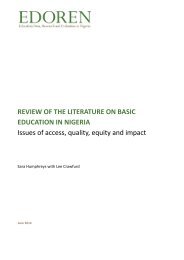review-of-the-literature-on-basic-education-in-nigeria-june-2014-3-1
review-of-the-literature-on-basic-education-in-nigeria-june-2014-3-1
review-of-the-literature-on-basic-education-in-nigeria-june-2014-3-1
Create successful ePaper yourself
Turn your PDF publications into a flip-book with our unique Google optimized e-Paper software.
Review <str<strong>on</strong>g>of</str<strong>on</strong>g> <str<strong>on</strong>g>the</str<strong>on</strong>g> <str<strong>on</strong>g>literature</str<strong>on</strong>g> <strong>on</strong> <strong>basic</strong> educati<strong>on</strong> <strong>in</strong> Nigeria2011). Tertiary educati<strong>on</strong> is delivered through universities, polytechnics, m<strong>on</strong>otechnics and colleges <str<strong>on</strong>g>of</str<strong>on</strong>g>educati<strong>on</strong> provided by a mixture <str<strong>on</strong>g>of</str<strong>on</strong>g> federal, state and private <strong>in</strong>stituti<strong>on</strong>s.Given <str<strong>on</strong>g>the</str<strong>on</strong>g> ever-<strong>in</strong>creas<strong>in</strong>g demands for <strong>basic</strong> educati<strong>on</strong>, <str<strong>on</strong>g>the</str<strong>on</strong>g> government now explicitly acknowledges <str<strong>on</strong>g>the</str<strong>on</strong>g>need to <strong>in</strong>clude n<strong>on</strong>-state providers as a means <str<strong>on</strong>g>of</str<strong>on</strong>g> achiev<strong>in</strong>g its educati<strong>on</strong>al aims, provided <str<strong>on</strong>g>the</str<strong>on</strong>g>y meetgovernment standards (FME 2004a; Larbi et al. 2004). These <strong>in</strong>clude for-pr<str<strong>on</strong>g>of</str<strong>on</strong>g>it schools, religious schools(generally Muslim or Christian) that <strong>in</strong>clude some secular subjects <strong>in</strong> <str<strong>on</strong>g>the</str<strong>on</strong>g>ir curriculum, and voluntary orcommunity-based <strong>in</strong>stituti<strong>on</strong>s.The <str<strong>on</strong>g>of</str<strong>on</strong>g>ficial age for enter<strong>in</strong>g Primary 1 is six years old. There is now a system <str<strong>on</strong>g>of</str<strong>on</strong>g> automatic promoti<strong>on</strong>, andpolicy dictates that <str<strong>on</strong>g>the</str<strong>on</strong>g> Primary School Leav<strong>in</strong>g Certificate awarded at <str<strong>on</strong>g>the</str<strong>on</strong>g> end <str<strong>on</strong>g>of</str<strong>on</strong>g> Primary 6 should nol<strong>on</strong>ger be a standard term<strong>in</strong>al exam but based purely <strong>on</strong> c<strong>on</strong>t<strong>in</strong>uous assessment (CA) (FME 2004a).However, <strong>in</strong> reality, practices vary (see Secti<strong>on</strong> 4.5). Similarly, <str<strong>on</strong>g>the</str<strong>on</strong>g> Junior School Certificate awarded at <str<strong>on</strong>g>the</str<strong>on</strong>g>end <str<strong>on</strong>g>of</str<strong>on</strong>g> JSS III should be based <strong>on</strong> a comb<strong>in</strong>ati<strong>on</strong> <str<strong>on</strong>g>of</str<strong>on</strong>g> CA and state exams (FME 2011a). Three years <str<strong>on</strong>g>of</str<strong>on</strong>g> seniorsec<strong>on</strong>dary school<strong>in</strong>g culm<strong>in</strong>ate <strong>in</strong> <str<strong>on</strong>g>the</str<strong>on</strong>g> Sec<strong>on</strong>dary School Certificate Exam<strong>in</strong>ati<strong>on</strong>, issued by <str<strong>on</strong>g>the</str<strong>on</strong>g> WestAfrican Exam<strong>in</strong>ati<strong>on</strong> Council (WAEC) or <str<strong>on</strong>g>the</str<strong>on</strong>g> Nati<strong>on</strong>al Exam<strong>in</strong>ati<strong>on</strong> Council (NECO), depend<strong>in</strong>g <strong>on</strong> <str<strong>on</strong>g>the</str<strong>on</strong>g>exam<strong>in</strong>ati<strong>on</strong> board used.Public educati<strong>on</strong> at <str<strong>on</strong>g>the</str<strong>on</strong>g> federal level is directed by <str<strong>on</strong>g>the</str<strong>on</strong>g> government-funded FME, under which lies <str<strong>on</strong>g>the</str<strong>on</strong>g>more recently formed UBEC, whose resp<strong>on</strong>sibilities are outl<strong>in</strong>ed more fully <strong>in</strong> secti<strong>on</strong>s 6.2 and 6.3.Although a government-funded department, it is also supported by <strong>in</strong>ternati<strong>on</strong>al development agenciessuch as UNICEF (<strong>in</strong> particular), DFID, UNESCO, and <str<strong>on</strong>g>the</str<strong>on</strong>g> World Bank, and supported <strong>on</strong> <str<strong>on</strong>g>the</str<strong>on</strong>g> ground byvarious local and <strong>in</strong>ternati<strong>on</strong>al NGOs. At state level, SUBEBs are resp<strong>on</strong>sible for <strong>basic</strong> educati<strong>on</strong>, whilewith<strong>in</strong> each LGA <str<strong>on</strong>g>the</str<strong>on</strong>g> LGEA is resp<strong>on</strong>sible.1.3 MethodologyThis <str<strong>on</strong>g>review</str<strong>on</strong>g> is nei<str<strong>on</strong>g>the</str<strong>on</strong>g>r systematic nor exhaustive but is as wide-rang<strong>in</strong>g as possible and selective with<strong>in</strong>certa<strong>in</strong> parameters. Literature is <strong>in</strong>cluded from 2000 to 2013, and mostly <str<strong>on</strong>g>literature</str<strong>on</strong>g> specifically aboutNigeria. Reports that covered West Africa and/or sub-Saharan Africa (SSA) were generally <strong>on</strong>lyc<strong>on</strong>sidered if <str<strong>on</strong>g>the</str<strong>on</strong>g>re was a whole chapter devoted to Nigeria.Occasi<strong>on</strong>al reference to <str<strong>on</strong>g>literature</str<strong>on</strong>g> outside <str<strong>on</strong>g>of</str<strong>on</strong>g> Nigeria has been made when <str<strong>on</strong>g>the</str<strong>on</strong>g>re was a paucity <str<strong>on</strong>g>of</str<strong>on</strong>g>relevant <str<strong>on</strong>g>literature</str<strong>on</strong>g> <strong>on</strong> a particular topic or to re<strong>in</strong>force a po<strong>in</strong>t, but <strong>on</strong> <str<strong>on</strong>g>the</str<strong>on</strong>g> whole we have tried to avoid<strong>in</strong>clud<strong>in</strong>g too much <str<strong>on</strong>g>of</str<strong>on</strong>g> <str<strong>on</strong>g>the</str<strong>on</strong>g> more general <str<strong>on</strong>g>literature</str<strong>on</strong>g> <strong>on</strong> SSA or even West Africa <strong>in</strong> order to keep <str<strong>on</strong>g>the</str<strong>on</strong>g><str<strong>on</strong>g>review</str<strong>on</strong>g> focused.Various search strategies were used to access <str<strong>on</strong>g>the</str<strong>on</strong>g> <str<strong>on</strong>g>literature</str<strong>on</strong>g>. For <str<strong>on</strong>g>the</str<strong>on</strong>g> grey <str<strong>on</strong>g>literature</str<strong>on</strong>g>, EDOREN teammembers c<strong>on</strong>tacted various government organisati<strong>on</strong>s – such as <str<strong>on</strong>g>the</str<strong>on</strong>g> Nati<strong>on</strong>al Commissi<strong>on</strong> for Colleges<str<strong>on</strong>g>of</str<strong>on</strong>g> Educati<strong>on</strong> (NCCE), <str<strong>on</strong>g>the</str<strong>on</strong>g> Nigerian Educati<strong>on</strong>al Research and Development Council (NERDC) and <str<strong>on</strong>g>the</str<strong>on</strong>g>Nigerian Commissi<strong>on</strong> for Nomadic Educati<strong>on</strong> (NCNE) – to seek specific reports that were already knownabout or that were menti<strong>on</strong>ed <strong>in</strong> o<str<strong>on</strong>g>the</str<strong>on</strong>g>r <str<strong>on</strong>g>literature</str<strong>on</strong>g>. They also made enquiries to see what o<str<strong>on</strong>g>the</str<strong>on</strong>g>r reportshad been produced or studies carried out by <str<strong>on</strong>g>the</str<strong>on</strong>g> department that <str<strong>on</strong>g>the</str<strong>on</strong>g>y were able to share.Internati<strong>on</strong>al journal articles and reports were sought via <str<strong>on</strong>g>the</str<strong>on</strong>g> usual <strong>in</strong>ternati<strong>on</strong>al search eng<strong>in</strong>es such asERIC, JSTOR, OCLOC World Cat and Google Scholar us<strong>in</strong>g a list <str<strong>on</strong>g>of</str<strong>on</strong>g> search terms (see Appendix II).Some articles <strong>in</strong> Nigerian journals were available <strong>on</strong>l<strong>in</strong>e; o<str<strong>on</strong>g>the</str<strong>on</strong>g>rs were <strong>on</strong>ly available <strong>in</strong> hard copy. Mostdid not <strong>in</strong>volve empirical study but we have cited some articles that were general <strong>in</strong> nature and gave anoverview <str<strong>on</strong>g>of</str<strong>on</strong>g> an issue (for example, about <str<strong>on</strong>g>the</str<strong>on</strong>g> difficulties <str<strong>on</strong>g>of</str<strong>on</strong>g> implement<strong>in</strong>g UBE) or which covered topicswhere empirical data were scarce.EDOREN – Educati<strong>on</strong> Data, Research and Evaluati<strong>on</strong> <strong>in</strong> Nigeria 6



